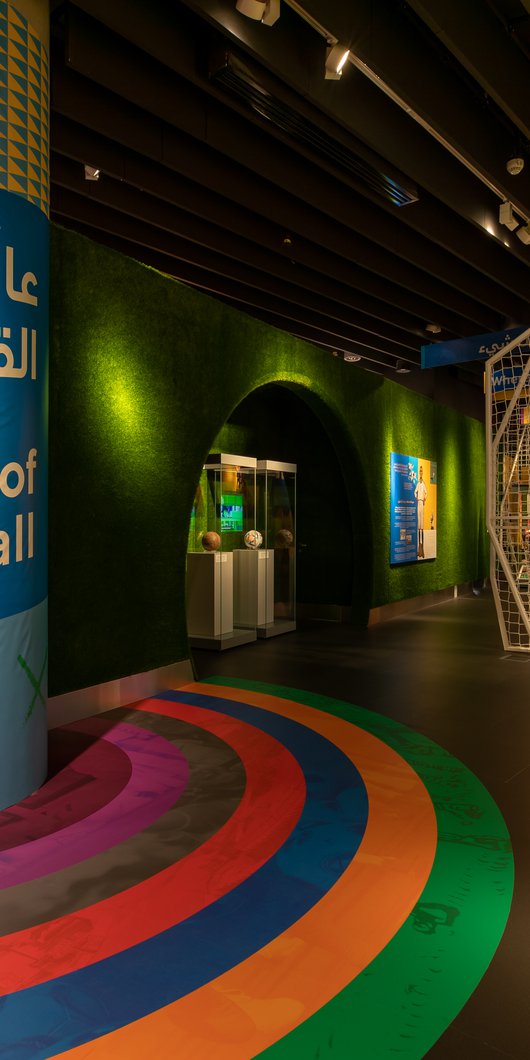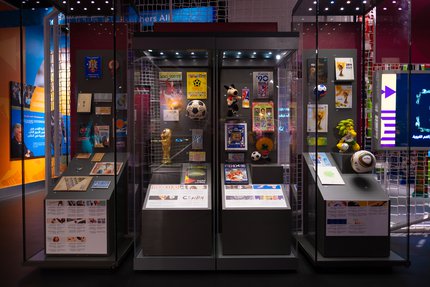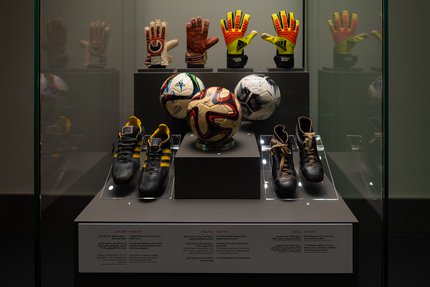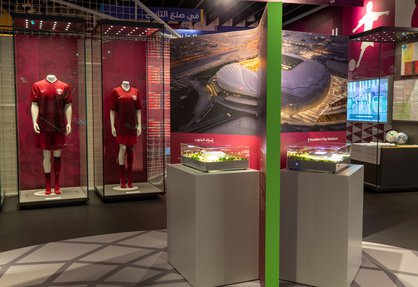Football for All, All for Football
The first half of the exhibition examines the global appeal of football – ‘the beautiful game’ that is played, watched and enjoyed by millions.

Just like a football match, the exhibition is displayed over two halves: Football for All, All for Football and The Road to Doha.
The first half of the exhibition examines the global appeal of football – ‘the beautiful game’ that is played, watched and enjoyed by millions.

Photo: Wadha Jabor Al Mesalam, courtesy of Qatar Museums ©2022
The type of football played at the FIFA World Cup Qatar 2022™ is known as 'Association football' and originated in England in the 1800s.
In 1863, the English Football Association (FA) was formed and in December of the same year the FA established the first laws of football.
The world’s first knockout tournament, the FA Cup, began in 1871. The first final was played the following year. The World Cup finals use this format from the Round of 16.
In November 1872, the world's first international match was played between England and Scotland. It ended with a 0-0 draw.
1888 saw the beginning of the English football league. This was the world's first league competition, and its format is now used in the group stages of World Cup finals.
Only men were allowed to take part in these early competitions. Although there were women's football teams in England, a 1921 FA ban restricted women's football until the 1970s.
“ Neither tripping nor hacking shall be allowed, and no player shall use his hands to hold or push an adversary. ”Law 10, The Rules of Association Football, 1863
The original laws of football were written by the English Football Association in 1863. The Laws have changed many times since then, but they are still simple compared to most team sports. This is one reason why the game is so popular. Today the Laws of the Game are administered on behalf of FIFA by the International Football Association Board. On the pitch they are enforced by the referee and assistant referees.
Who, of course, always get it right!
Out of the millions of people who enjoy playing football around the globe, only a special few will compete at the World Cup finals. To make it that far takes a combination of natural talent, hard work, dedicated training and often a bit of luck!

Photo: Wadha Jabor Al Mesalam, courtesy of Qatar Museums ©2022
The greatest football players often become global superstars. Their talent and superb skills are recognized and admired by fans around the world. The FIFA World Cup™ gives the greatest players the chance to showcase their skills at the highest level.
But even the greatest are not guaranteed to end up on the winning side. Football is a team game, and great teamwork can often overcome even the most talented individuals. This is what makes football such a fascinating game, and the FIFA World Cup its most compelling tournament.
Behind every great team there is a great coach or manager. They must be able to lead their players to success on the pitch. They must be tactical masters, flexible enough to adapt depending on how a match is going. They must have an eye for talent, to spot the best and help them improve. They must be able to manage their players, from the superstars to the young hopefuls. Their team’s success on the pitch will make them famous – but their team’s failure will usually cost them their job!
Football fans are the life force of the game. From supporting their local team to supporting their country, their enthusiasm, passion and noise creates an atmosphere that no other sport can match.
The FIFA World Cup™ brings together football fans from every continent as they follow their teams through the tournament. Every World Cup is an emotional journey – there will be highs and lows for everyone. But the sounds and the colours of the fans are always unforgettable.

Photo: Wadha Jabor Al Mesalam, courtesy of Qatar Museums ©2022
The second half of the exhibition follows the long journey to Qatar 2022™ , from the first FIFA Men’s World Cup™ in Uruguay in 1930, to the final at the Lusail Stadium on 18 December 2022.
On the 2nd of December 2010, Qatar won the right to host the FIFA Men’s World Cup 2022™. The road to Doha has been a long one. Football has been steadily developing in Qatar since the 1940s and now, over nine decades since the first World Cup was held in Uruguay in 1930, the tournament will be held for the first time in an Arab nation.
Qatar's successful bid is recognized internationally as a spectacular achievement, with 2022 marking the culmination of an historic journey for both the tournament and the nation of Qatar.
Qatar is proud to be the first Arab nation to stage the FIFA World Cup with the successful bid recognised internationally as a spectacular achievement.
The first ever FIFA World Cup™ tournament took place in Uruguay in 1930. Uruguay was chosen as host due to the national team’s success as Olympic football champions in 1924 and 1928, and in honour of the country’s centenary celebrations. Thirteen nations took part in the competition. Only four European countries sent teams who travelled to Uruguay by ship. All the matches took place in the capital, Montevideo. The final took place on 30 July 1930 in the newly built Estadio Centenario. Uruguay became the first world champions, beating their neighbours Argentina 4–2.
In 2009, Qatar took the first steps on the road becoming hosts of the FIFA World Cup 2022™. In 2010, Qatar's dream of being the first Arab nation to host the tournament became a reality and preparations to welcome the world to Qatar began.
This preparation, and in particular the construction of eight spectacular stadiums, has been an extraordinary journey. But this journey will not end with the final whistle in the 2022 World Cup final. From the beginning, Qatar has planned for the tournament to leave a sustainable and meaningful legacy for the country, the Middle East, Asia and the world.

Photo: Ali Al Anssari, courtesy of Qatar Museums ©2022
Generation Amazing Foundation (GA) was set up in 2010 during Qatar’s successful bid for the FIFA World Cup 2022™. It is the leading social and human legacy initiative for Qatar and beyond. GA teaches values like gender equality and inclusivity, and life skills like communication, teamwork and leadership — all through football.
At the heart of GA is the Sport for Development (S4D) methodology, as well as the UN Sustainable Development Goals. GA uses the unique ability of football to instantly engage young people and help them develop. Over the years Generation Amazing has impacted over 1 million lives in 35 countries. It has achieved this through its core initiatives and programmes, including Football for Development, Youth Advocates, Youth Festival and GA Community Clubs.